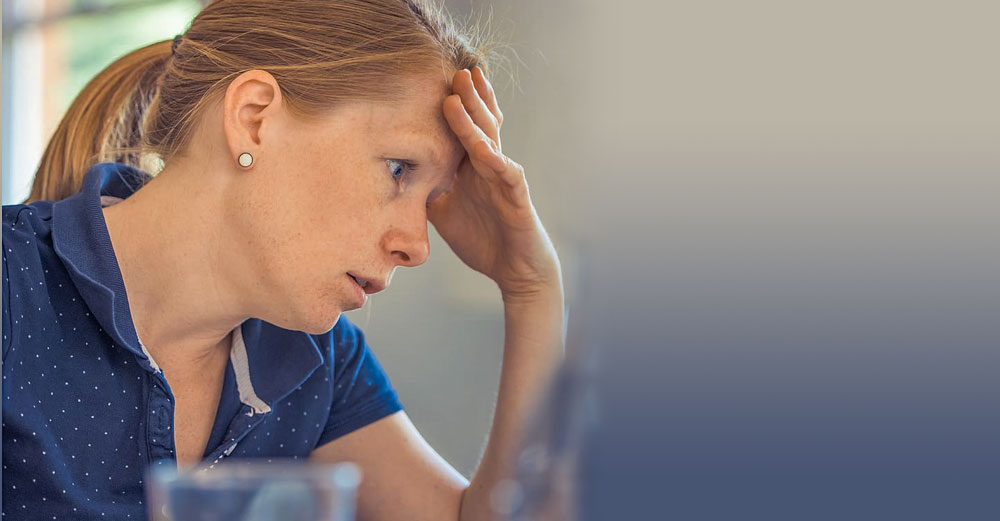
Illness. Job loss. Isolation. In a world fraught with anxiety and uncertainty brought on by the COVID-19 pandemic, people are seeking ways to manage their stress. The Institute for Disaster Mental Health (IDMH) at SUNY New Paltz is emerging as a vital resource for support and information during this time.
Led by psychologists Amy Nitza and Karla Vermeulen, the IDMH is working to ensure the mental well-being of the campus and community, and beyond. That means helping people as they manage stress, juggle new responsibilities and confront the challenges of the COVID-19 pandemic.
The two women are more accustomed to dealing with natural disasters, like the earthquake in Puerto Rico, where they helped train teachers in helping their students. A global pandemic however, is an entirely new kind of a disaster, with no clearly marked beginning, middle and end.
“Usually, with a natural disaster, it happens, and it’s over,” says Vermeulen, PhD, deputy director of the IDMH. “There is a warning period, then you’re in the middle of it, and then there’s a post-impact phase where you can recognize the losses. Now there’s no endpoint. There’s just this element of dread.”
Finding Calm in Chaos
Since 2004, the IDMH has served as a resource for helping victims overcome the stress and trauma caused by disasters. The IDMH has lent their expertise on all types of events, from earthquakes and floods to school shootings and car crashes. The institute also trains and works with students, the community, and people in helping professions to help them deliver evidence-based and culturally appropriate support.
Overcoming the mental health challenges of the COVID-19 pandemic has been a struggle, especially since it’s still happening. “Getting people to be safe and feel safe is the first step in the recovery process,” Nitza says. “But right now, things are so indefinite. The ambiguity makes it hard for people to recover.”
Social distancing has added to the difficulty. On March 23, Nitza and Vermeulen did a webcast to the Administrative Council at SUNY New Paltz, along with faculty and other staff. Also in virtual attendance were local government officials, including village trustees and the mayor.
The presentation, which was called “Psychological First Aid and Stress Management,” was designed to help participants understand the impact of stress and trauma and how to minimize it. The two women spoke to an empty room during their talk, despite the presence of 125 people who had participated through Webex.
“We did receive a lot of positive feedback,” Nitza says. “They were looking for concrete things to do and ways for taking care of themselves and other people.”
The institute also published a series of tip sheets for managing stress, coping with the pandemic, and managing relationships under stay-at-home orders.
Advice for the Anxious
Enduring the various facets of stress from the pandemic requires thought. For starters, it’s important to recognize that anxiety during the pandemic is to be expected. Other tips include:
- Be in the moment. Focus on what’s happening right now, without trying to imagine or contemplate what the “new normal” will look like.
- Have a designated worry time that allows you to compartmentalize your concerns.
- Limit media exposure. Watch or read the reports once in the morning and once at night. Resist the urge to follow the news all day.
- Figure out what stresses you out the most, and find ways to minimize it. If it’s grocery shopping, consider getting groceries delivered or ways to reduce your time in the store.
- Be mindful of all the positive things you do have.
- Find ways to stay connected to family, friends, and colleagues.
Vermeulen says she takes comfort in remembering the tragedy of 9/11. “Things did become okay again, even though they were impactful and long lasting. I firmly believe we will get through this, too.”
For more resources, view The Psychological First Aid & Stress Management Toolkit Power Point.




Studies after studies have shown that good aerobic exercises like swimming, jogging or brisk walking can, apart from improving your sense of well being, cause the release of certain chemicals in the brain. These chemicals, structurally similar to opioids have been found invoke a feeling of euphoria, thus attenuating that feeling of despair, and can as well reduce stress, both of which are major factors that contribute to mental illness.
I think my sister is experiencing anxiety due to the loss of her husband, which is why I’m thinking of bringing her to a mental health center. Well, this is going to be difficult, but you’re right that it would be best if she’ll focus on what’s happening right now. I’ll also keep in mind to tell him that he must be mindful of all the positive things that are happening in his life.
As people work from home, stress and anxiety levels are through the roof – a recent survey, said that 36% of Indian employees are suffering from mental health issues.
I’ve never had a big problem with anxiety before. Like any student, sometimes I was stressed before my exams or because of the heavy workload. But it was all easy to solve. In the last month, I really felt anxious and panicked because I didn’t know how to deal with it. Long days of self-awareness, acceptance, and positive thinking had brought me back to normal (almost). Therefore, I wish all those who experience the same problem to stay strong!
As someone who is also struggling with heightened anxiety during this trying time, I can’t stress enough just how important it is to focus on the now. It’s what can be controlled, after all, instead of what happened in the past or what may occur in the future. Focusing on the world around you goes a long way.